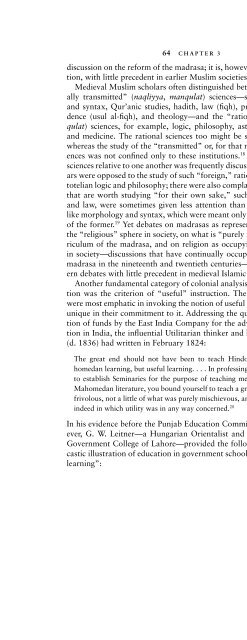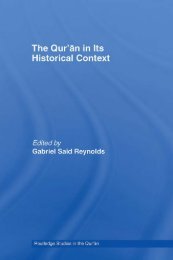Download (1 MB) - Islam and Christian-Muslim Relations: Articles ...
Download (1 MB) - Islam and Christian-Muslim Relations: Articles ...
Download (1 MB) - Islam and Christian-Muslim Relations: Articles ...
You also want an ePaper? Increase the reach of your titles
YUMPU automatically turns print PDFs into web optimized ePapers that Google loves.
64 CHAPTER 3discussion on the reform of the madrasa; it is, however, a modern distinction,with little precedent in earlier <strong>Muslim</strong> societies. 17Medieval <strong>Muslim</strong> scholars often distinguished between the “traditionallytransmitted” (naqliyya, manqulat) sciences—such as morphology<strong>and</strong> syntax, Qur’anic studies, hadith, law (fiqh), principles of jurisprudence(usul al-fiqh), <strong>and</strong> theology—<strong>and</strong> the “rational” (‘aqliyya, ma‘-qulat) sciences, for example, logic, philosophy, astronomy, arithmetic,<strong>and</strong> medicine. The rational sciences too might be studied in madrasas,whereas the study of the “transmitted” or, for that matter, any other scienceswas not confined only to these institutions. 18 The st<strong>and</strong>ing of thesciences relative to one another was frequently discussed, <strong>and</strong> many scholarswere opposed to the study of such “foreign,” rational sciences as Aristotelianlogic <strong>and</strong> philosophy; there were also complaints that the sciencesthat are worth studying “for their own sake,” such as Qur’an, hadith,<strong>and</strong> law, were sometimes given less attention than ancillary disciplineslike morphology <strong>and</strong> syntax, which were meant only to assist in the studyof the former. 19 Yet debates on madrasas as representing, <strong>and</strong> guarding,the “religious” sphere in society, on what is “purely religious” in the curriculumof the madrasa, <strong>and</strong> on religion as occupying a distinct spherein society—discussions that have continually occupied reformers of themadrasa in the nineteenth <strong>and</strong> twentieth centuries—are eminently moderndebates with little precedent in medieval <strong>Islam</strong>ic societies.Another fundamental category of colonial analysis in matters of educationwas the criterion of “useful” instruction. The English Utilitarianswere most emphatic in invoking the notion of useful learning, though notunique in their commitment to it. Addressing the question of the allocationof funds by the East India Company for the advancement of educationin India, the influential Utilitarian thinker <strong>and</strong> historian James Mill(d. 1836) had written in February 1824:The great end should not have been to teach Hindoo learning, or Mahomedanlearning, but useful learning. ...Inprofessing, on the other h<strong>and</strong>,to establish Seminaries for the purpose of teaching mere Hindoo, or mereMahomedan literature, you bound yourself to teach a great deal of what wasfrivolous, not a little of what was purely mischievous, <strong>and</strong> a small remainderindeed in which utility was in any way concerned. 20In his evidence before the Punjab Education Commission of 1884, however,G. W. Leitner—a Hungarian Orientalist <strong>and</strong> the principal of theGovernment College of Lahore—provided the following somewhat sarcasticillustration of education in government schools in terms of “usefullearning”:



